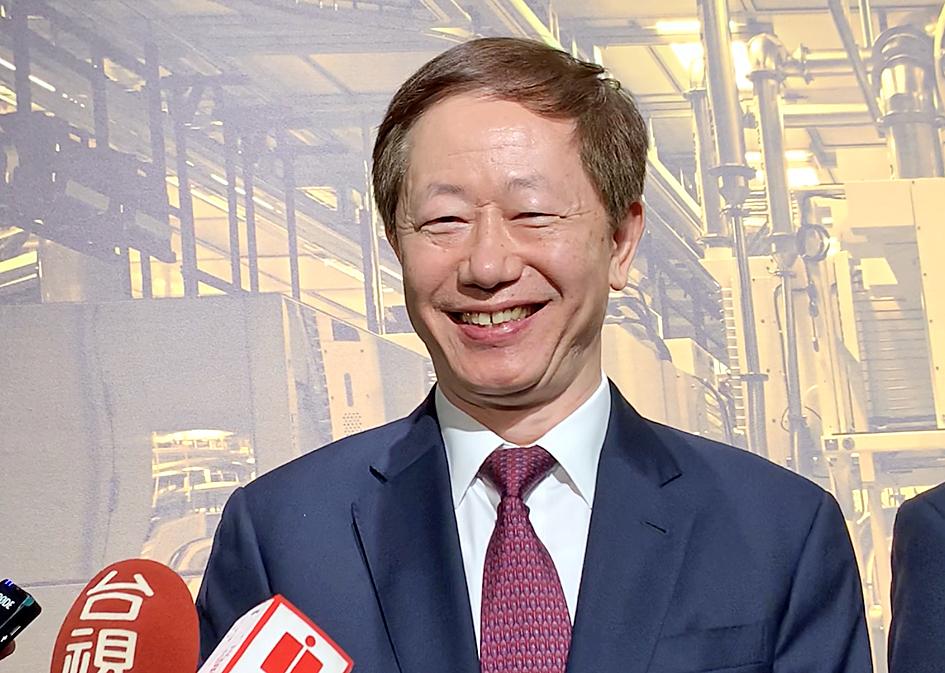The share price slump that has erased about US$100 billion from the market value of Taiwan Semiconductor Manufacturing Co (TSMC, 台積電) this year means little to the legion of analysts who see the stock as a screaming buy.
TSMC shares are expected to climb about 50 percent to a record high 12 months from now, according to sell-side analyst estimates compiled by Bloomberg, as macro headwinds buffeting the sector ease and investors focus on the company’s fundamentals.
Fund managers are also starting to view an end in sight to the rout, and TSMC chairman Mark Liu’s (劉德音) Wednesday forecast for 30 percent revenue growth this year bolsters this case.

Photo: Tsai Shu-yuan, Liberty Times.
The company’s sales last month grew 65 percent from last year, TSMC reported yesterday after the market closed.
Shares fell 2 percent during the session in Taipei.
While the scale of TSMC’s drop is notable, having shed more than 10 percent of its share value, it is still about half the fall this year in the global semiconductor benchmark index.
The company occupies a powerful position in the global technology supply chain as the most advanced maker of chips for giants from Apple Inc to Nvidia Corp.
“Buyers may return as soon as non-fundamental factors disappear,” said Alex Huang (黃俊斌), manager of Capital Hi-Tech Fund of Capital Investment Trust Corp (群益投信).
Being the largest and the most liquid stock on Taiwan’s equity market has made TSMC an easy selling target for some foreign investors, Huang said.
“While many worry about a cyclical correction, we forecast share gain and robust pricing, which will ensure TSMC grows uninterruptedly this year, and also in 2023 and 2024,” Sanford C Bernstein analysts including Mark Li wrote in note earlier this month.
Of the 37 recommendations by analysts compiled by Bloomberg, 34 are buys, three are holds and none are sells.
“We think TSMC stock is already factoring in a downturn,” JPMorgan Chase & Co analysts including Gokul Hariharan said.
“However, the extent of potential downside to 2023 estimates is still unclear,” they said, while maintaining a buy rating.
Others are less hesitant.
Morgan Stanley analysts including Charlie Chan (詹家鴻) said the current nervousness in the market presents a good opportunity to buy TSMC.
“We think now is a great time to accumulate,” Chan wrote in a report late last month, noting the company’s technology leadership.

Semiconductor shares in China surged yesterday after Reuters reported the US had ordered chipmaking giant Taiwan Semiconductor Manufacturing Co (TSMC, 台積電) to halt shipments of advanced chips to Chinese customers, which investors believe could accelerate Beijing’s self-reliance efforts. TSMC yesterday started to suspend shipments of certain sophisticated chips to some Chinese clients after receiving a letter from the US Department of Commerce imposing export restrictions on those products, Reuters reported on Sunday, citing an unnamed source. The US imposed export restrictions on TSMC’s 7-nanometer or more advanced designs, Reuters reported. Investors figured that would encourage authorities to support China’s industry and bought shares

FLEXIBLE: Taiwan can develop its own ground station equipment, and has highly competitive manufacturers and suppliers with diversified production, the MOEA said The Ministry of Economic Affairs (MOEA) yesterday disputed reports that suppliers to US-based Space Exploration Technologies Corp (SpaceX) had been asked to move production out of Taiwan. Reuters had reported on Tuesday last week that Elon Musk-owned SpaceX had asked their manufacturers to produce outside of Taiwan given geopolitical risks and that at least one Taiwanese supplier had been pushed to relocate production to Vietnam. SpaceX’s requests place a renewed focus on the contentious relationship Musk has had with Taiwan, especially after he said last year that Taiwan is an “integral part” of China, sparking sharp criticism from Taiwanese authorities. The ministry said

US President Joe Biden’s administration is racing to complete CHIPS and Science Act agreements with companies such as Intel Corp and Samsung Electronics Co, aiming to shore up one of its signature initiatives before US president-elect Donald Trump enters the White House. The US Department of Commerce has allocated more than 90 percent of the US$39 billion in grants under the act, a landmark law enacted in 2022 designed to rebuild the domestic chip industry. However, the agency has only announced one binding agreement so far. The next two months would prove critical for more than 20 companies still in the process

CHANGING JAPAN: Nvidia-powered AI services over cellular networks ‘will result in an artificial intelligence grid that runs across Japan,’ Nvidia’s Jensen Huang said Softbank Group Corp would be the first to build a supercomputer with chips using Nvidia Corp’s new Blackwell design, a demonstration of the Japanese company’s ambitions to catch up on artificial intelligence (AI). The group’s telecom unit, Softbank Corp, plans to build Japan’s most powerful AI supercomputer to support local services, it said. That computer would be based on Nvidia’s DGX B200 product, which combines computer processors with so-called AI accelerator chips. A follow-up effort will feature Grace Blackwell, a more advanced version, the company said. The announcement indicates that Softbank Group, which until early 2019 owned 4.9 percent of Nvidia, has secured a